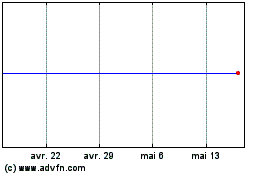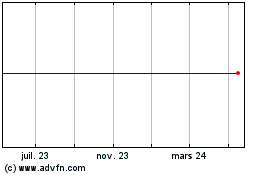Indian Politics Thwart Modi's Tax-Reform Plans
23 Décembre 2015 - 2:40PM
Dow Jones News
NEW DELHI—Partisan bickering in India's Parliament has stalled
an important piece of Prime Minister Narendra Modi's economic
agenda: a constitutional amendment that would create a simplified
nationwide tax system to replace a commerce-stifling patchwork of
state levies.
The winter session of India's legislature ended Wednesday
without a vote on the measure in the upper house, where Mr. Modi's
Bharatiya Janata Party is in the minority, after lawmakers spent
weeks trading jabs over graft allegations involving top
politicians.
Fixing the tax system is "in the big-bang reforms category, so
had it passed, it would have been a great sentiment booster—and a
necessary one," said D.K. Joshi, chief economist at ratings company
Crisil. Instead, he said: "The economy suffers while politics
overrides everything."
Mr. Modi's landslide victory in the 2014 national elections,
which gave his party a commanding majority in Parliament's lower
house, raised expectations among investors for swift and sweeping
economic change in India.
The prime minister instead adopted a more incremental approach,
like working to make state enterprises more efficient, rather than
privatizing them. Now he is facing a complicated political
situation.
Mr. Modi and his party suffered a significant blow last month
when the BJP lost badly in state elections in Bihar to an
opposition alliance.
Facing opposition protests and fearing a rural backlash ahead of
the Bihar vote, Mr. Modi in August retreated from legislative
efforts to ease India's strict land-acquisition law and make it
easier for the government to get land for industry and
infrastructure.
Mr. Modi also failed to get a vote on the tax amendment in the
previous session of Parliament, which ended in August.
The gridlock is the result, in part, of a tit-for-tat strategy
by the main opposition Congress party, whose final years in power
were marred by protests led by the BJP. When Congress was in
government, the BJP blocked tax legislation similar to what it is
now trying to pass.
With major plans stymied in Parliament, Mr. Modi has sought to
breathe life into the economy through executive actions and other
moves, including a plan to revive heavily-indebted
power-distribution companies and ease foreign-investment limits in
some industries.
For most of Parliament's winter session, disruptions in the
upper house were accompanied by political tussling and mudslinging
outside.
Congress accused Mr. Modi of a political vendetta after the
party's president, Sonia Gandhi, and her son, Rahul, were summoned
before a magistrate to answer a complaint alleging cheating and
criminal breach of trust.
Emerging from court Saturday, Mr. Gandhi said Mr. Modi had
encouraged "false allegations" to frighten political rivals. The
government said it wasn't involved in the case. The complaint was
filed by politician Subramanian Swamy in 2012. He later joined the
BJP.
Politics were also disrupted after the federal Central Bureau of
Investigation searched the offices of a senior aide to the chief
minister of Delhi, Arvind Kejriwal, whose Aam Aadmi Party is
aligned against the BJP.
A post on Mr. Kejriwal's official Twitter account called Mr.
Modi a "coward and a psychopath." The episode spiraled to include
corruption allegations by Mr. Kejriwal against BJP Finance Minister
Arun Jaitley, who in turn filed a defamation suit against Mr.
Kejriwal.
These much publicized spats narrowed the space for a political
compromise needed to break the logjam on economic
policy-making.
On the tax amendment, Congress has said it doesn't support some
key provisions. It argues the tax rate should be capped at 18%—and
that number must be included explicitly in the constitution—to
prevent a creeping increase by future governments.
It also wants to do away with a proposed 1% additional levy
designed to help manufacturing states.
Mr. Jaitley said the government is willing to find ways to
address Congress's second demand, but won't legislate the tax rate
so future governments have flexibility. He accused Congress of an
"obstructionist attitude" that, he said, "inflicts an economic
injury on the country."
"Sometimes it's this side to blame, sometimes it is that side,"
said M.R. Madhavan, president of PRS Legislative Research, a New
Delhi-based think tank. "In the end, Parliament has become a forum
less for debate and more to settle political scores."
Write to Niharika Mandhana at niharika.mandhana@wsj.com
(END) Dow Jones Newswires
December 23, 2015 08:25 ET (13:25 GMT)
Copyright (c) 2015 Dow Jones & Company, Inc.
Twitter (NYSE:TWTR)
Graphique Historique de l'Action
De Juin 2024 à Juil 2024

Twitter (NYSE:TWTR)
Graphique Historique de l'Action
De Juil 2023 à Juil 2024
